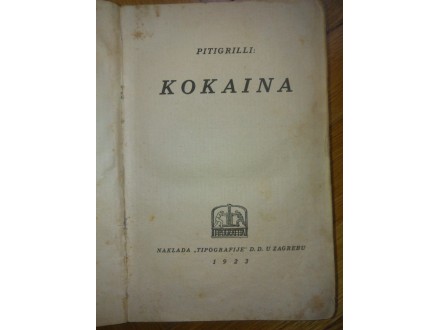Pitigrilli - Kokaina - 1923
| Cena: |
| Želi ovaj predmet: | 1 |
| Stanje: | Polovan sa vidljivim znacima korišćenja |
| Garancija: | Ne |
| Isporuka: | Pošta Post Express Lično preuzimanje |
| Plaćanje: | Tekući račun (pre slanja) Lično |
| Grad: |
Beograd-Vračar, Beograd-Vračar |
ISBN: Ostalo
Godina izdanja: 1900 - 1949.
Tematika: Književnost
Kulturno dobro: Predmet koji prodajem nije kulturno dobro ili ovlašćena institucija odbija pravo preče kupovine
Jezik: Srpski
Autor: Strani
Pitigrilli - Kokaina
Tipografija DD, Zagreb, 1923.
Tvrd povez, rikna se gotovo odvojila, 265 strana. Ako se prekorici, bice ovo sasvim dobar primerak.
RETKO!
Pitigrili
Pitigrilli was the pseudonym of Dino Segre, (9 May 1893 - 8 May 1975), an Italian writer who made his living as a journalist and novelist.[1] His most noted novel was Cocaina (Cocaine) (1921), published under his pseudonym and placed on the list of prohibited books by the Catholic Church because of his treatment of drug use and sex. It has been translated into several languages and re-issued in several editions. Pitigrilli published novels up until 1974, the year before his death.
He founded the literary magazine Grandi Firme, which was published in Turin from 1924 to 1938, when it was banned under the anti-Semitic Race Laws of the Fascist government. Although baptized a Catholic, Segre was classified as Jewish at that time. His father was Jewish, and Pitigrilli had married a Jewish woman (although they had long lived apart).[2] He had worked in the 1930s as an informant for OVRA, the Fascist secret service, but was dismissed in 1939 after being exposed in Paris.
Pitigrilli had traveled in Europe in the 1930s while maintaining his house in Turin. His efforts, beginning in 1938, to change his racial status were not successful, and he was interned as a Jew in 1940, after Italy`s entrance into the war as an ally of Germany. He was released the same year, and wrote anonymously in Rome to earn money. After Mussolini`s government fell in 1943 and the Germans began to occupy Italy, Pitigrilli fled to Switzerland, where his second wife (a Catholic) and their daughter joined him. They lived there until 1947, then moved to Argentina. Segre and his family returned to Europe in 1958 and settled in Paris, occasionally visiting Turin.[3]
Predmet: 74866377









